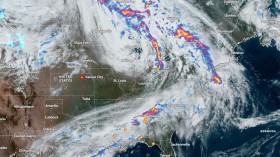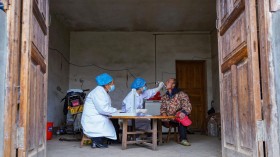Scientists have finally mapped the global spread of the contagious, sexually transmitted cancer between mating dogs.
The canine transmissible venereal tumor or CTVT is a cancer that spreads between dogs through the transfer of living cells, which happens during mating. The cancer, which is considered one of the most infectious cancers known to science, manifests in both male and female dogs as genital tumors. The tumor was said to originate from a single dog 11,000 years ago. But it outlived its original host by transferring from one dog to another, and is still spreading to this day.
According to a study published in the journal eLife, an international team led by researchers at the University of Cambridge mapped the progress of this cancer based on DNA from 449 tumors in 39 countries. They also discovered that some of the cancer's recent travel between continents aligns with maritime trade routes, as dogs used to accompany human seafarers during their travels.
Aside from highlighting the shared migration between dogs and humans, the tumor's genetic history includes a surprising quantity of DNA "stolen" from its host.
According to the study, the process of swapping mitochondrial DNA has occurred at least five times since the original cancer arose. This discovery allowed researchers to create a "family tree" of the cancer to show how the cancer has journeyed around the planet.
"Normally the dog is a transient host - and then the tumor gets passed on to more dogs. But what has happened occasionally is that DNA from the dog actually enters the tumor cells," said Dr. Elizabeth Murchison, senior author of the study.
"So rather than carrying the mitochondria of the original dog that lived 11,000 years ago, the tumor is now carrying the host's mitochondria. And it's going to pass those on to the next dog," Murchison added.
A branch in the CTVT "family tree" suggests that the tumor has spread from Russia or China around 1,000 years ago. It only came to the Americas within the last 500 years, probably taken by European colonialists.
© 2024 NatureWorldNews.com All rights reserved. Do not reproduce without permission.

![Microplastics Escape Body's Gut to 'Infiltrate' the Brain, Kidneys and Liver [Study]](https://1471793142.rsc.cdn77.org/data/thumbs/full/70195/280/157/50/40/microplastics-escape-bodys-gut-to-infiltrate-the-brain-kidneys-and-liver-study.jpg)



